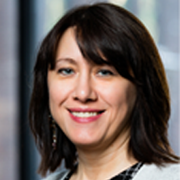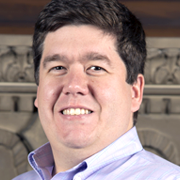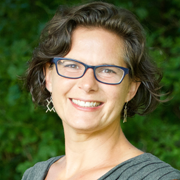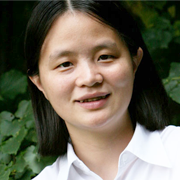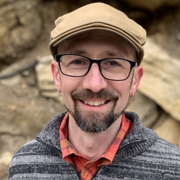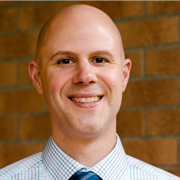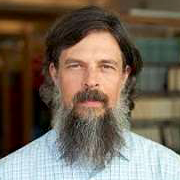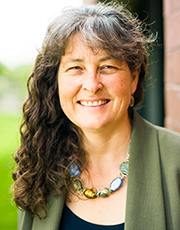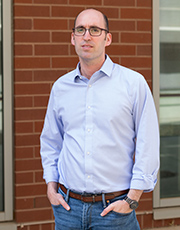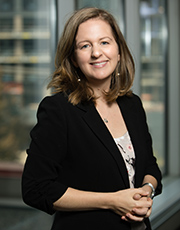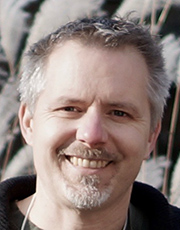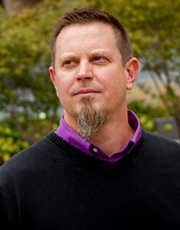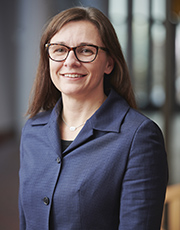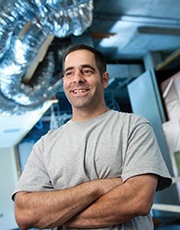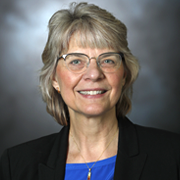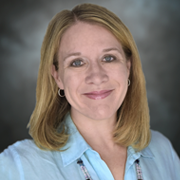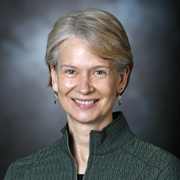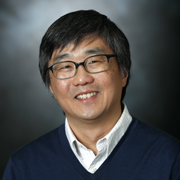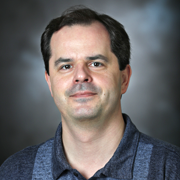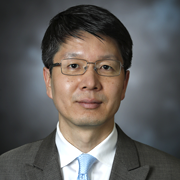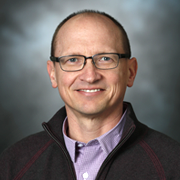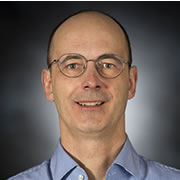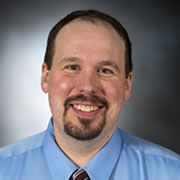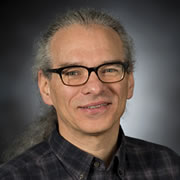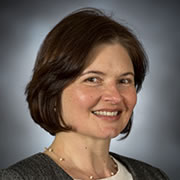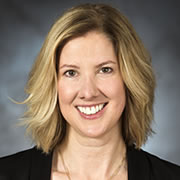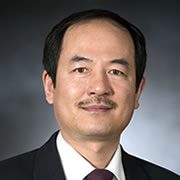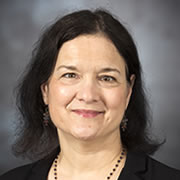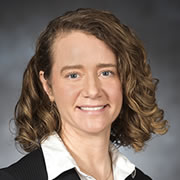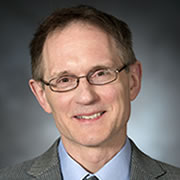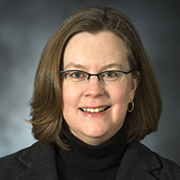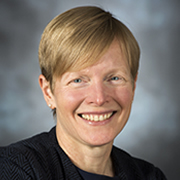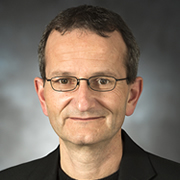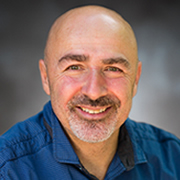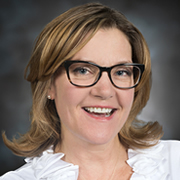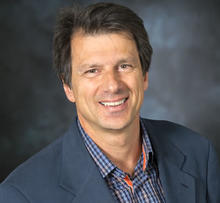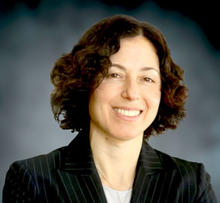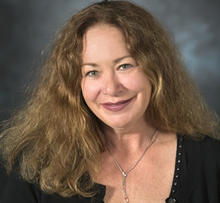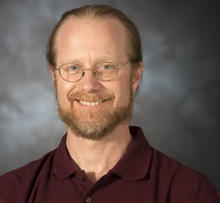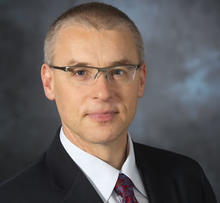The Distinguished McKnight University Professorship program recognizes outstanding faculty members who have recently achieved full professor status. Recipients hold the title “Distinguished McKnight University Professor” for as long as they remain employed at the University of Minnesota.
2024 Distinguished McKnight Professors
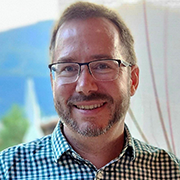
David R Boulware
Medicine (Infectious Diseases & International Medicine)
Medical School
Advancing therapeutics for COVID-19 and for HIV-related meningitis through clinical trials to impact global guidelines.
David Boulware is an infectious disease physician-scientist who has built a clinical research team focused on improving the diagnosis, treatment, and prevention of HIV- related meningitis in low and middle income countries. Early in the COVID-19 pandemic, Boulware stepped forward to create and lead a series of innovative remote, internet-based nationwide randomized clinical trials testing outpatient COVID-19 therapeutics. These trials informed international treatment guidelines for a number of medications, most notably hydroxychloroquine and ivermectin.
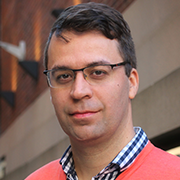
Peter Bruggeman
Mechanical Engineering
College of Science and Engineering
Plasma Science and Engineering for Advancing Human Health and Sustainability
Peter Bruggeman’s research is focused on plasma science and engineering, the investigation of ionized gases, and plasma-based technologies that enable advances in health care and sustainability. His research group is particularly known for state-of-the-art diagnostic approaches and collaborative multidisciplinary studies that uncovered the mechanisms of the interactions of plasmas with solids, liquids and living matter. His research has enabled fundamental and technological advances in four areas: decontamination, water treatment, green chemical conversion, and manufacturing.
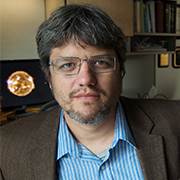
Paul Dauenhauer
Chemical Engineering & Materials Science
College of Science and Engineering
Catalysis for Sustainable Energy and Materials
Producing energy with limited impact on the environment is a leading challenge for engineers in the 21st century. Paul Dauenhauer’s research uses catalysts to control and optimize reactions to convert water, nitrogen, and carbon dioxide to manufacture carbon-neutral fuels, materials including biodegradable plastics, carbon-sequestering solids, and liquid hydrogen carriers such as ammonia. Transformational reactions and catalytic materials are designed using mechanistic insight, fundamental chemical kinetics, and quantitative mathematical modeling of catalytic systems.
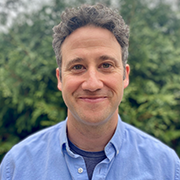
Joshua M. Feinberg
Earth and Environmental Sciences
College of Science and Engineering
Understanding the Earth and its environments through the magnetism of natural materials
Joshua Feinberg is a geophysicist who studies the magnetic properties of natural materials to advance understanding of the behavior of the Earth’s magnetic field, track environmental change through time, and characterize novel magnetic materials. He combines magnetic methods with field geology and electron microscopy to explore processes that operate on global, tectonic, outcrop, and nanometer scales. Feinberg is also passionate about improving the effectiveness and inclusivity of undergraduate education.

Jasmine Foo
Mathematics
College of Science and Engineering
Mathematical modeling for precision oncology
Jasmine Foo’s research focuses on developing mathematical theories that describe the complex processes driving cancer evolution, using probability theory, differential equations, and statistics. Her research leverages these results to gain insights into cancer progression, optimal therapy regimens, and personalized treatments. Foo collaborates closely with experimental biologists and clinicians to integrate these mathematical models with clinical and experimental data, with the ultimate goal of improving our understanding of cancer and how to treat it.
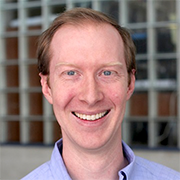
Jason D. Hill
Bioproducts and Biosystems Engineering
College of Food, Agricultural and Natural Resource Sciences
Sustainability of food and energy systems
Jason Hill seeks to understand the environmental impacts of our food and energy systems, and to find ways of making them more sustainable. He takes a life cycle perspective in exploring effects on climate change and air quality in the United States and globally. His work on these topics—and on biofuels, greenhouse gas accounting, and environmental justice—have been used to inform consumers and policymakers on how to move toward a more sustainable future.

R. Stephanie Huang
Experimental and Clinical Pharmacology
College of Pharmacy
Finding better ways to treat cancer while reducing toxicity through computational drug repurposing
Ineffectiveness and/or severe toxicity are commonly associated with cancer therapy. Stephanie Huang is an international leader in the field of pharmacogenomics of anticancer therapy. She develops novel models to translate complex cancer molecular profiles to therapeutic decisions. Her work enables the identification and repurposing of efficacious drugs to treat cancers and tailor therapy to the right patients. The net result is faster, less costly development of more effective, less toxic anticancer medications.
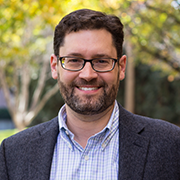
Ronald R. Krebs
Political Science
College of Liberal Arts
Rhetoric, narrative, and the politics of national security
Rhetorical battles over national security are not a sideshow diverting attention from the “real” drivers of policy. Ron Krebs’ award-winning research has uncovered how language in its various forms, from rhetorical tropes to dominant narratives, shapes the politics of national security. His research into the origins of national security policy, grand strategy, the effects of war on democracy, and militarism—among many other substantive questions—has shown that language is power politics.
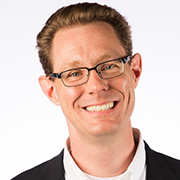
Nathan Kuncel
Psychology
College of Liberal Arts
What leads to success in school, work, and life and how do we measure it accurately?
Nathan Kuncel has substantially widened and deepened our understanding of how personal characteristics affect success in school, work, and life in general. At the same time, he has demonstrated that many common practices in admissions and hiring are both ineffective and biased, which has led to the identification of better practices in these two critical domains.

Chad L. Myers
Computer Science and Engineering
College of Science and Engineering
Computing on genetic networks to chart the rules of life
Chad Myers’s research focuses on developing data mining and machine learning methods for analyzing large-scale genomic data to understand how genes function, and more broadly, how biological systems are organized. His lab has developed approaches for mapping, analyzing, and integrating biological networks to answer questions in a variety of systems from yeast to humans. Myers’s work has advanced our understanding of how genome variation affects traits.
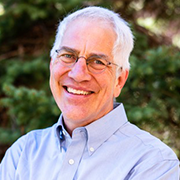
Eric W. Seabloom
Ecology, Evolution and Behavior
College of Biological Sciences
Securing the University of Minnesota as an international center of excellence in ecology
Eric Seabloom is an internationally recognized plant ecologist who has helped to establish how anthropogenic increases in nutrient availability affect biological invasions, ecosystem productivity, and other ecological processes. His leadership of local field stations and international networks of field sites has helped to secure the University of Minnesota in the top three universities internationally in the field of ecology.

Changquan Calvin Sun
Pharmaceutics
College of Pharmacy
Materials science and engineering for improved pharmaceuticals
Changquan Calvin Sun advances the science and technology required to develop and manufacture high-quality tablet products to promote the health and well-being of society. By introducing new characterization tools and applying integrated crystal and particle engineering techniques, he has solved several long-standing problems in tablet manufacturing. Sun is known for his transformative and systematic work leading to the efficient design of high-quality and low-cost medicines.
2023 Distinguished McKnight Professors

Jerica M. Berge
Family Medicine and Community Health
Medical School
Addressing multi-level determinants of whole-person health to achieve health equity
Jerica Berge’s research aims to achieve whole-person health (i.e., physical, mental, behavioral, social) for all people. Using her multidisciplinary strengths from the fields of mental health, public health, and medicine, she develops groundbreaking mixed-methods studies to identify multi-level determinants (i.e., individual, interpersonal, community, societal/structural) of whole-person health in children and families to work towards achieving health equity. Her strategic and comprehensive approach accelerates the science to directly impact clinical care and public health.
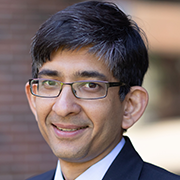
Aditya Bhan
Chemical Engineering and Materials Science
College of Science and Engineering
Catalysis for energy conversion and sustainability
Energy and the environment are now concerns shared by science and society. Aditya Bhan’s research exploits catalytic chemistry to control and facilitate new reaction pathways for synthesis of fuels and chemicals from low carbon-intensity feedstocks. Bhan’s scholarship is grounded in fundamentals of mechanistic understanding, detailed chemical kinetics, and quantitative mathematical description of reaction systems as they exist in realistic and complex reaction environments.
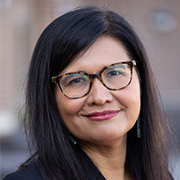
Bianet Castellanos
American Studies
College of Liberal Arts
Indigenous migrations in the Americas
Bianet Castellanos is a leading international scholar of Indigenous migration, Latino Studies, and community-engaged research. She has developed new frameworks to center Indigenous experiences with migration, tourism, and urbanism. Her groundbreaking research has paved the way for a hemispheric Indigenous Studies and the emergent field of Critical Latinx Indigeneities. Her community-engaged research has helped Indigenous and Latino peoples combat racial inequalities. A dedicated teacher, she has recruited and mentored cohorts of Indigenous students.
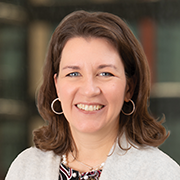
Ellen W. Demerath
Epidemiology and Community Health
School of Public Health
Novel mechanisms underlying the developmental origins of health and disease
Ellen W. Demerath’s unique evolutionary perspective on human health has helped elucidate how genetic, epigenetic, and nutritional determinants shape disease risk at critical developmental periods. Her team is critically advancing nutritional approaches to improving outcomes for preterm infants and has established one of the largest and most comprehensive studies of human milk, a key player in intergenerational health. Her impact has been felt across a range of disciplines, from genetic epidemiology to maternal and child nutrition.
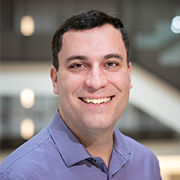
Rafael M. Fernandes
Physics and Astronomy
College of Science and Engineering
The secret life of electrons in quantum materials
Quantum materials host a rich landscape of fascinating electronic phases of matter, whose unique properties offer promising opportunities for technological applications. They are enabled by the often-exotic collective behavior of the electrons inside these materials, subjected to the intricate laws of quantum physics. Rafael Fernandes’ research has provided a window on this secret life of electrons, shedding new light on how they conspire to realize unusual quantum phases, most notably quantum analogs of liquid crystals.
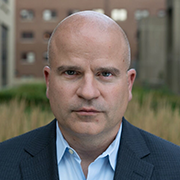
Joseph E. Gaugler
Health Policy and Management
School of Public Health
Bridging the gap between the science and practice of dementia care innovation
The rapidly increasing prevalence of Alzheimer’s disease in our aging population poses many challenges to our caregiving families, healthcare systems, and communities. Joseph E. Gaugler’s community-engaged scholarship has focused on the design, evaluation, and implementation of innovations to bridge the gap between the science and practice of dementia care so that people who live with dementia and those who help them receive optimal support.
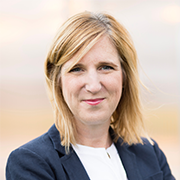
Jessica J. Hellmann
Ecology, Evolution, and Behavior
College of Biological Sciences
Tackling climate change by connecting academic knowledge with real world challenges
Jessica J. Hellmann, director of Institute on the Environment and Professor in the Department of Ecology, Evolution and Behavior is an ecologist, conservation biologist, and climate scientist. She examines the impacts of climate change on natural and human systems, studies techniques for adapting to climate change, and informs our next steps towards a sustainable economy and future. Jessica Hellmann leads efforts to integrate scholarly research with policy development and concerns of community stakeholders.
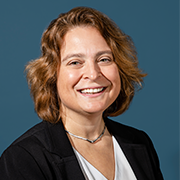
Pinar Karaca-Mandic
Finance
Carlson School of Management
Improving Value and Equity in Health
Guided by a vision to improve “value” and “equity” in health, Pinar Karaca-Mandic’s research has contributed to four intersecting areas of scientific knowledge and policy guidance: (1) value and diffusion of medical technologies and treatments, (2) uptake of evidence-based information on safety and effectiveness, (3) access and affordability of healthcare through health insurance, and (4) sustainable financial and technology innovations to address market frictions and social determinants of health such as food insecurity and housing instability.
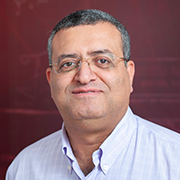
Mohamed Mokbel
Computer Science and Engineering
College of Science and Engineering
Building Scalable Spatially-Aware Systems
Mohamed Mokbel’s research interests lie at the intersection of system building and spatial computing. His work addresses challenges raised by the ubiquity and unique characteristics of spatial data, produced from a myriad of devices ranging from smartphones to satellites. His group has enriched the computing system infrastructure by building spatially-aware widely used systems, tools, and techniques for spatial big data management and analysis, machine learning, location privacy, recommender systems, and social networks.
2022 Distinguished McKnight Professors
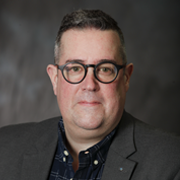
Marc F. Bellemare
Applied Economics
College of Food, Agricultural and Natural Resource Sciences,
The economics of food systems
Marc Bellemare’s research is at the intersection of agricultural economics, food policy, international development, and applied econometrics. He has studied the poverty-reduction potential of agricultural value chains in low- and middle-income countries, the consequences of high and volatile food prices on welfare, and agricultural and food policy. In addition to making highly influential contributions to the economics of food systems, he has made significant contributions to the empirical methods used by economists and other social scientists.
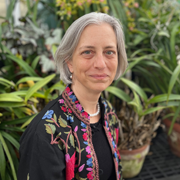
Elizabeth Borer
Ecology, Evolution and Behavior
College of Biological Sciences
Developing a global understanding of ecosystem responses to human impacts
Elizabeth Borer combines mathematical theory with powerful empirical tests replicated at global scales to get at big ecological questions: What are the causes and consequences of global biodiversity loss? How are humans altering the basic functioning of the Earth’s ecosystems? What controls the spread of disease in natural ecosystems? She has transformed how we do ecological research through her leadership of a replicated experiment across 160 sites in 29 countries.
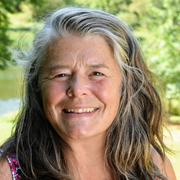
Julie R. Etterson
Biology
Swenson College of Science and Engineering
University of Minnesota Duluth
Understanding biotic response to climate change and taking restorative action with community partners
Julie Etterson has dedicated her career to advancing our understanding of biotic response to anthropogenic change. She uses the tools of ecological genetics to study adaptation of wild populations and to test management approaches that can be implemented today to transition natural communities as the environment changes around them. She also developed a national research seed bank that will be used to document and dissect mechanisms of evolution over the next 50 years.
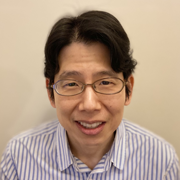
Chris H. Kim
Electrical and Computer Engineering
College of Science and Engineering
Quantum-inspired computers for solving computationally intractable problems
Chris Kim’s research interests lie at the intersection of emerging semiconductor devices, energy-efficient integrated circuits, and novel computing architectures. His group has been working closely with the microelectronics industry to develop core circuit technologies for enhancing the performance, energy-efficiency, security, and longevity of future electronic systems. Recently, he is investigating a new quantum-inspired computing paradigm where the natural relaxation process of physically coupled oscillators is harnessed to solve complex problems such as traveling salesman.
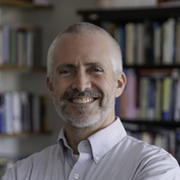
Alan C. Love
Philosophy
College of Liberal Arts
Between philosophy and biology: Interdisciplinarity in theory and practice
Philosophy and the study of living systems have been intertwined since antiquity. However, the formation of academic disciplines in the modern university has separated biology and philosophy in contemporary inquiry. Alan Love’s research seeks to bridge this divide through an account of concepts and scientific problems that provides a foundation for interdisciplinary research and demonstrates its capacity to advance knowledge by showing how it works in practice, while helping others to go and do likewise.

R. Lee Penn
Chemistry
College of Science and Engineering
Making and transforming nanoparticles in natural and engineered systems
Lee Penn is passionately committed to advancing sustainability, understanding how anthropogenic and natural chemicals and materials transform and move through the environment, preventing negative impacts of pollution, and developing methods to remediate polluted environments. Further, they aim to make materials for advanced technologies that are less toxic and use Earth abundant elements. Finally, they prioritize promoting welcoming and inclusive climates in science, technology, engineering, and math through education, advocacy, allyship, and outreach.
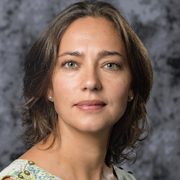
Claudia Scarlata
Physics and Astronomy
College of Science and Engineering
From the first galaxies to the Milky Way
Claudia Scarlata has made significant contributions to the understanding of the sources responsible for the reionization, the last major transformation of the Universe, only a few hundred million years after the Big Bang. Her work uses state of the art observing facilities to shed light on the physical processes regulating the growth of galaxies over cosmic time.
Irina Stepanov
Environmental Health Sciences
School of Public Health
Applying analytical biochemistry tools and building translational research capacity to drive cancer prevention and control
Cancer is the second leading cause of death worldwide and its burden is expected to grow globally. Leveraging her background in analytical biochemistry, Irina Stepanov works on generating novel and systematic data on carcinogen exposures and biological effects in susceptible populations, and develops global capacity for such research. This work serves to inform evidence-based interventions and policies aimed at cancer prevention in populations bearing the disproportionate share of the global cancer morbidity and mortality.
2021 Distinguished McKnight Professors
Russell J. D. Holmes
Chemical Engineering and Materials Science
College of Science and Engineering
Engineering nanoscale energy transport for next-generation optoelectronics and solar cells
Russell Holmes works to understand and improve the optical and electronic behavior of nanoscale films of carbon-based, organic semiconductors. These materials will revolutionize technologies for information display, lighting, sensing, and energy conversion, by improving performance and enabling mechanically flexible devices. Holmes uses fundamental knowledge of material properties to design novel optoelectronic devices and elucidate underlying device physics. He is especially known for engineering energy transport in organic semiconductors, with applications in light-emitting devices and solar cells.
Panayiota (Pani) Kendeou
Educational Psychology
College of Education and Human Development
Advancing the science of reading and transforming educational practice
Panayiota Kendeou’s cutting-edge research on the cognitive processes of reading comprehension advances our understanding of reading and transforms reading instruction in K-12 schools. Through methodologically rigorous research, Kendeou develops models that explain how students learn to read and read to learn, and uses these models to design innovative, educational technologies that are used at scale. The significance of her approach is in the integration of scientific advancements and technological innovations that improve reading and learning.
Katy Backes Kozhimannil
Health Policy and Management
School of Public Health
Advancing rural health and racial equity, starting at birth
Rising rates of maternal mortality in the U.S. reveal systemic failures that end in tragedy. Katy Backes Kozhimannil leads collaborative, community-engaged policy research to advance racial, gender, and geographic equity, starting at birth. The goal of her scholarship is to inform policy that addresses social determinants and structural injustice to promote improved health and wellbeing, with a focus on childbirth in rural places, low-income communities, and among Black, Indigenous and People of Color.
Vanessa G. Lee
Psychology
College of Liberal Arts
Cognitive and neural mechanisms of attention
Why do drivers sometimes miss red lights and radiologists cancerous tumors? How can we reduce human errors? Vanessa Lee’s research examines attention – the brain mechanism that allows us to focus on important tasks. She showed that although attention is limited, people are highly adept at learning to attend to important aspects of their environment. This ability, preserved in older adults, young children, and individuals with neurological disorders, may facilitate tasks like driving and cancer diagnosis.
Dylan B. Millet
Soil, Water and Climate
College of Food, Agricultural, and Natural Resource Sciences
Understanding human and natural influences on atmospheric chemistry: Implications for climate, air quality, and health
Dylan Millet’s research seeks to understand the sources, atmospheric transformations, and impacts of key gases affecting air pollution, human and ecosystem health, and climate. His work ranges from polluted urban areas to remote environments, and helps untangle the roles of human activities versus natural processes in determining the chemical properties of Earth’s atmosphere. He combines in-situ measurements, satellite observations, and atmospheric modeling to advance scientific knowledge for more accurate air quality and climate predictions.
Michael J. Silverman
Music
College of Liberal Arts
Increasing access to evidence-based music therapy for adults with mental health and substance use conditions
Michael J. Silverman is a Board-Certified Music Therapist and Director of the University’s Music Therapy Program. In group music therapy sessions at the University’s medical center, he uses songwriting and lyric analysis interventions to improve the wellbeing of people with mental health and substance use conditions. With over 135 refereed journal articles, Michael’s recovery-oriented scholarship has formed the foundation of the music therapy evidence base in adult mental health and increased access to services.
Mark J. Thomas
Neuroscience
Medical School
Putting neuroscience into action to end drug addiction
Addiction is one of our most challenging societal problems; it is widespread, costly and difficult to treat. We need a new way forward. Mark Thomas’ research is built on the idea that addiction is not a moral failure, but a biological one. By using state-of-the-art technology to examine the brain’s role in addiction, his lab is making discoveries expected to unlock transformative new therapies and break the stigma that surrounds this devastating brain disorder.
2020 Distinguished McKnight Professors
Jeannine Cavender-Bares
Ecology, Evolution and Behavior
College of Biological Sciences
Advancing biodiversity science through integration of ecology, remote sensing and the tree of life
Biodiversity forms the basis of ecosystem functioning and our life support systems. Jeannine Cavender-Bares pioneered the use of the “tree of life” in ecology with the first empirical examples that explain current biodiversity patterns based on their evolutionary history. Her work explains the ecological diversification and community assembly of the dominant group of trees in North America. Currently, she is harnessing remote sensing to detect hotspots of tree diversity, tree disease, and ecosystem services for sustainability.
Kevin D. Dorfman
Chemical Engineering and Materials Science
College of Science and Engineering
Engineering next-generation genomics technologies
Kevin Dorfman’s research applies chemical engineering concepts to analyze “lab-on-a-chip” methods for manipulating DNA molecules for genomics. His group uses a combination of clean-room nanofabrication, single molecule DNA microscopy experiments, and state-of-the-art computational modeling to uncover the basic physical principles underlying how these technologies operate. Dorfman is particularly known for applying this integrated approach to genome mapping in nanochannels, a new method for locating large-scale variations in human genomes.
Melissa N. Laska
Division of Epidemiology and Community Health
School of Public Health
Changing the future for vulnerable populations through access to nutritious foods
Obesity contributes to more than 400,000 deaths in the U.S. each year, while millions of Americans lack access to healthy, affordable foods. Melissa Laska tackles these interconnected human health risks by investigating the challenges of young people in transition to adulthood, the most vulnerable stage for excess weight gain, and the dynamics of urban “food deserts.” She uses her findings to advance crucial nutrition promotion practices and local, state, and federal policies addressing food access.
Angus W. MacDonald, III
Psychology
College of Liberal Arts
Brain functioning, cognitive control, and schizophrenia
Angus MacDonald’s research investigates psychosis, with a focus on cognitive control, brain functioning, and the development of novel research methods to investigate these processes. His groundbreaking, internationally recognized research has appreciably advanced our understanding of mental illness in general and schizophrenia in particular.
David Masopust
Microbiology and Immunology
Medical School
T cell immune surveillance
T cells survey the body, eliminate infected or cancerous cells, and form memories that enhance future immune responses. Inappropriate T cell responses cause autoimmunities, allergies, and inflammatory diseases. David Masopust’s work defined how T cells survey the body, form immunological memory, and identified and characterized a major immune system component, tissue resident memory T cells. Masopust examines how these cells can be leveraged to form vaccines and therapies for infectious disease, cancer, and chronic inflammation.
Amy B. Monahan
Law School
Making employee benefits work: Improving health and retirement plan regulation
Amy Monahan’s research focuses on improving the regulation of employer-provided health and retirement plans. Her health-related scholarship explores how market forces and tax incentives influence the provision of health insurance, while her groundbreaking work on state and local government pensions has helped governments, employees, and taxpayers better understand the realities of, and potential solutions to, significantly underfunded public pensions.
Essa Yacoub
Radiology
Medical School
Probing brain function and organization with high spatial and temporal precision via high field MRI
Essa Yacoub’s work is focused on developing and applying high field magnetic resonance imaging (MRI) and functional MRI (fMRI) techniques for human applications. His work has emphasized pushing the spatial and temporal resolution limits of fMRI using high magnetic fields. With the ability to non-invasively monitor the working human brain with such high degrees of spatial and temporal precision, his efforts have enabled novel explorations into intrinsic functional architectures and neuronal inter-connections.
2019 Distinguished McKnight Professors
Deborah A. Ferrington
Ophthalmology & Visual Neurosciences, Medical School
Pioneering studies in the aging eye and age-related macular degeneration
Considering the growing number of senior citizens worldwide, there is an urgent need to prevent age-related diseases. This proactive strategy requires an understanding of aging at the cellular level. Deborah Ferrington’s investigations of the aging retina and of age-related macular degeneration (AMD), the elderly’s primary cause of blindness, have led to novel insights into the unique factors that distinguish normal aging from disease. These advances in knowledge have led to new strategies for treating AMD.
Christy L. Haynes
Chemistry, College of Science & Engineering
Pushing the limits of analytical chemistry
Christy Haynes’ research pushes the limits of measurement technology in complex environments to reveal critical insights related to human health and safety. Haynes’ expertise in making and characterizing nanoscale materials, executing high sensitivity analytical measurements, and working in complex biological and ecological systems has facilitated impactful contributions in toxicology, physiology, biomedicine, and sustainable design.
Susan D. Jones
Ecology, Evolution & Behavior, College of Biological Sciences
Living with human-animal diseases: Lessons from history
Through her path-breaking research in the global history of human-animal diseases (plague, anthrax, influenza), Jones works to understand how we can keep human and animal populations healthy without destroying our environment. History reveals how some past disease eradication campaigns failed tragically, contributing to famine, large-scale sociocultural disruption, and environmental degradation. Working with local people, building on existing social institutions, and collaborating with scientists, Jones helps chart new directions in understanding and controlling re-emergent human-animal diseases.
Richard M. Lee
Psychology, College of Liberal Arts
The role of culture, race, and ethnicity in Asian American mental health
Richard Lee contests traditional psychological theories and research by prioritizing the racial and ethnic experiences of Asian American and other minority youth and their families. He has developed new, important conceptual models and measurement instruments to better understand the role of immigration, acculturation, discrimination, and identity development. Moreover, he has used his empirical findings to help develop interventions designed to prevent mental health problems. His groundbreaking, internationally recognized research has helped to establish the field of ethnic minority and cultural psychology.
Vuk Mandic
School of Physics & Astronomy, College of Science & Engineering
Searching for the beginning of time
Vuk Mandic has made significant contributions to the recent discoveries of gravitational waves with LIGO and Virgo detectors and to searches for Dark Matter, the missing mass in the universe that is believed to hide in the form of new massive particles. His experiments aim to illuminate the first moments of the evolution of the universe and to understand the physical laws that apply at very high energies that are not reproducible in laboratories.
Sang-Hyun Oh
Electrical & Computer Engineering, College of Science & Engineering
Miniaturization of nanostructures toward the atomic scale
Sang-Hyun Oh's group invented a new technique called atomic layer lithography capable of generating features as small as one nanometer, exceeding the resolution limit of state-of-the-art manufacturing technologies by more than an order of magnitude. Other conventional techniques cannot mass-produce such small and uniform gaps. The resulting structures are essential building blocks for electronic, optical devices, and biosensors, thus these methods have been widely adopted by many researchers world-wide to perform experiments in previously inaccessible regimes.
Kevin D. Wickman
Pharmacology, Medical School
Molecules and mechanisms that regulate cell excitability in the heart and brain
The function of the heart and brain is shaped by excitatory and inhibitory influences acting at the cellular level. Many debilitating medical problems including arrhythmias, epilepsy, addiction, and pain are caused by an imbalance in cell excitability. Professor Kevin Wickman seeks to elucidate molecular mechanisms that impact cell excitability in the heart and brain. With this knowledge, new approaches to diagnose, treat, or prevent medical problems linked to pathological excitability can be envisioned, developed, and optimized.
2018 Distinguished McKnight Professors
David A. Chang
History, College of Liberal Arts
Indigenous People, Global Visions: Transforming Understandings of Nations and Empires through Indigenous History
David A. Chang has moved the fields of American history and global history dramatically forward, revealing the complexity of Native people’s intellectual engagements with global currents, and demonstrating how indigenous people’s relations with colonizers shaped the development of the United States’ boundaries, economy, and identity. Over the course of two award-winning books and over a dozen articles in leading journals, he has expanded the field and range of Indigenous studies by pushing beyond disciplinary boundaries.
Martin Greven
School of Physics & Astronomy, College of Science & Engineering
Deciphering the Complex Properties of Unconventional Superconductors
Martin Greven’s research focuses on the experimental study of copper-oxide superconductors, one of the most active research fields in physics during the past three decades. Such superconductors have significant technological potential, yet their enigmatic properties defy conventional wisdom. Professor Greven has pioneered the growth of pristine crystals of the most desirable of these quantum materials and made several breakthrough discoveries regarding their electromagnetic properties using a variety of experimental techniques.
Satish Kumar
Chemical Engineering & Materials Science, College of Science & Engineering
The Engineering Science of Liquid-Phase Materials Processing
Materials in a liquid state must be extruded, molded, spread, and dried to manufacture a wide range of products such as coatings, films, and fibers, as well as biomedical, mechanical, and electronic devices. Professor Kumar’s research uses a combination of theory and experiment to address fundamental issues that are central to understanding, designing, and optimizing these materials processing operations. Working with industrial partners, Kumar formulates and studies problems to advance both fundamental understanding and industrial practice.
Glenn I. Roisman
Institute of Child Development, College of Education & Human Development
The Enduring Legacy of Early Interpersonal Experiences
Professor Roisman has spent his distinguished career extending into adulthood landmark longitudinal studies of human development that span the life-course. Leveraging these unique datasets and innovative statistical methods, Roisman’s contributions reveal: (a) in which domains, (b) through what mechanisms, and (c) for whom early relationship experiences endure in their impacts. His current work is illuminating how childhood experiences support or undermine adults’ physical health via studies that disambiguate the effects of social experiences from genetics.
Michael Travisano
Ecology, Evolution & Behavior, College of Biological Sciences
The Origins of Biological Innovation
Innovation in biological systems is the fundamental basis for life, and is responsible for its complexity and diversity. Professor Travisano’s research is focused on understanding the origins of biological innovation experimentally. He investigates innovations at different levels of organization in laboratory experiments with microbes. Current research concentrates on the origins of gene function, multicellularity and life itself. This research changes how we view living systems and opens opportunities for innovation in antibiotics and understanding disease.
Natalia Y. Tretyakova
Medicinal Chemistry, College of Pharmacy
Environmental DNA Damage and Its Role in Disease
Natalia Tretyakova’s research is focused on advancing the frontiers of environmental health and medicine. She has made breakthrough discoveries of the mechanisms of epigenetic deregulation and cancer causing mutations associated with environmental exposure and lifestyle factors. Professor Tretyakova has pioneered novel methodologies to detect DNA damage, evaluated the ability of altered DNA bases to induce genetic mutations, and developed DNA based biomarkers of cancer risk. Her work has advanced our understanding of the role of DNA damage in human disease, informing future strategies for improving human health.
2017 Distinguished McKnight Professors
Stephanie M. Carlson
Institute of Child Development, College of Education and Human Development
Self-control in Early Childhood
Stephanie Carlson conducts research on the development of executive function (the brain basis of self-control), including how to measure it in children as young as age 2; what to expect of children of different ages and life experiences; what distinguishes children who have better or worse executive function; and perhaps most importantly, how to improve these critical skills that predict greater achievement in multiple areas of life.
Tianhong Cui
Mechanical Engineering, College of Science and Engineering
Micro and Nano-Systems for High Performance Sensors
Tianhong Cui’s research is in the area of Micro/Nano Electro Mechanical Systems (M/NEMS). He is a pioneer in self-assembled M/NEMS and in polymer nanomanufacturing. M/NEMS sensors have become pervasive in every-day life from detecting collisions in cars to measuring motion in cellular phones to detecting markers of diseases in medicine. Cui’s research focuses on using “bottom up” self-assembly approaches and polymer processing to develop new functional materials that greatly expand the functionalities of M/NEMS sensors.
Reuben S. Harris
Biochemistry, Molecular Biology and Biophysics, Medical School and College of Biological Sciences
Mechanisms of Mutation in Immunity and Cancer
Reuben Harris is dedicated to advancing frontiers in mutation research. He has made breakthrough discoveries on mechanisms of mutation in multiple areas including bacterial evolution, antibody diversification, retrovirus restriction, and cancer pathogenesis. His fundamental discoveries have become textbook models and informed strategies for improving human health. His recent work on cancer mutation has revealed a major pathogenic role for enzymes called APOBECs, and this breakthrough has created clear opportunities for diagnostic and therapeutic advances.
Monica Luciana
Psychology, College of Liberal Arts
Adolescent Brain Development and Impacts of Substance Use
Using neurobehavioral probes and pioneering longitudinal designs, Monica Luciana is making transformative contributions to the understanding of adolescent development. Her theoretical and empirical work has advanced understanding of mechanisms of change, providing novel insights about adolescent risk-taking and how the developing brain is impacted by substance use. This
work educates parents and teachers, guides public health prevention efforts, informs legislation regarding legal drinking and driving ages, and presents practical dilemmas for juvenile justice.
Theresa M. Reineke
Chemistry, College of Science and Engineering
Innovating Polymeric Materials for Therapeutic Delivery and Sustainability
Theresa Reineke’s research is focused on improving human health and the environment through pioneering contributions to the field of polymer chemistry. Her research has enabled fundamental and applied technology advancements in three areas: polymer-based biomolecule delivery systems for treatment of genetic disease, enhancing oral delivery of important drugs with polymer-based delivery systems, and sustainable and environmentally friendly polymers/plastics from naturally occurring chemicals derived from plants.
Loren Terveen
Computer Science and Engineering, College of Science and Engineering
Fulfilling the Promise of Online Collaboration for All
Loren Terveen’s research is concentrated in the areas of human-computer interaction and social computing. Specifically, Professor Terveen's work addresses opportunities and challenges raised by the emergence and eventual universal adoption of the World Wide Web. He has focused on developing algorithms and user interfaces to help people locate information more effectively; analyzing how people communicate and work together online; and creating new interaction techniques to address these problems and meet these needs.
2016 Distinguished McKnight Professors
William A. Arnold
Environmental Engineering, College of Science and Engineering
Clean Water for All: Ensuring the Quality and Safety of Water Resources
Prof. Arnold's research centers on the environmental fate and impacts of manmade chemicals on which modern society relies. He seeks to define the processes by which industrial chemicals, pesticides, and pharmaceuticals are transformed in aquatic systems. He evaluates chemical persistence in lakes and rivers, identifies potentially harmful reaction products, and develops technologies to clean up contaminated waters to reverse or prevent environmental damage. His work ensures safe, clean water for people and ecosystems.
Kristin E. Hickman
Law School
Tax Administration: Efficacy and Legitimacy Through Transparency and Accountability
Oliver Wendell Holmes, Jr. described taxes as “the lifeblood of government” and “the price we pay for a civilized society.” Without effective tax administration, taxes go uncollected, and government ceases to function. Kristin Hickman’s work evaluates IRS administrative practices with an eye toward facilitating and legitimizing tax administration through transparency, public participation, and judicial review. Relied upon by scholars, lawyers, the IRS, and the courts, her work is reshaping tax administration in the United States.
Sarah E. Hobbie
Ecology, Evolution & Behavior, College of Biological Sciences
Understanding Consequences of Human-Caused Environmental Changes for Ecosystems:from Cities to the Great Plains
From local to global scales, human activities, inadvertently and through deliberate management, are altering climate, atmospheric chemistry, landscapes, and biodiversity. Hobbie’s research aims to understand how these environmental changes are altering the structure and functioning of ecosystems. Her research ranges from city neighborhoods, where she explores the consequences of urbanization for biodiversity and water quality, to the Central Great Plains, where she explores ecosystem feedbacks to the global climate system.
George Karypis
Computer Science & Engineering, College of Science and Engineering
Practical and Effective Algorithms for Big Data Applications on High-Performance Computing Architectures
The nominee’s research work is concentrated in the areas of high-performance computing and data mining and focuses on developing novel algorithms that are grounded in theory and solve important problems in scientific computing, business intelligence, e-commerce, online systems, biology, and drug discovery, and on translating this research into practical and efficient software tools that can be used to solve real-world problems in these areas. These tools can be used both for educational purposes and also to enable novel research in the various scientific disciplines.
Michael Lackey
English, Division of the Humanities, University of Minnesota Morris
Literature, Political History, and Social Justice
From his book about African American atheist writers, which examines the role the God concept has played in the subjugation and violation of certain groups of people, to his multibook project about biofiction (literature that names its protagonist after an actual historical figure), Michael Lackey’s pioneering work as editor, interviewer, and author clarifies how literature functions to expose the structures and conditions of oppression and charts cultural and political pathways toward a more socially just future.
Erika Lee
History, College of Liberal Arts
Immigration and Race in the U.S. and the World
Lee’s path-breaking research examines global migration and its consequences, especially to the U.S., from the colonial era to the present. She has discovered new sources of historical research and developed new frameworks that have changed the way scholars understand and write American and global history. Her award-winning books have broad national and international influence, she has helped to establish the interdisciplinary field of Asian American Studies, and she is a highly sought-after public intellectual.
Kathleen Vohs
Marketing, Carlson School
The Perils and Promise of Human Motivation
Professor Vohs studies human motivation, which inspires action toward immediate desires and lofty goals. Self-control helps people prioritize long-term outcomes over immediate rewards, and thus is exceptionally important for health, prosperity, rationality, and relationship success. Vohs shows why self-control failures are so common, and how to prevent them. Vohs discovered that the mere idea of money changes motivation. Thoughts about money enhance subsequent persistence and performance — but impede giving, helping, and caring.
2015 Distinguished McKnight Professors
George E. Heimpel
Entomology
Biological Control at a Crossroads in Agriculture and Conservation
In biological control, living organisms are introduced to control invasive species. This method has been used with great success, but also carries ecological risk. Professor Heimpel is making fundamental contributions in implementing this strategy to protect both soybeans in the U.S. and Darwin’s finches in the Galapagos Islands. He is also developing conceptual models that allow a balancing of benefits and risks in biological control to arrive at best overall solutions for managing invasive species.
Alexandra B. Klass
Law
Transporting Energy: U.S. Infrastructure Challenges
Alexandra Klass’s research centers on energy law, environmental law, and natural resources law. Her recent work explores laws governing the nation’s energy transportation infrastructure—oil pipelines, natural gas pipelines, and electric transmission lines—and how changes in those laws could better respond to the new domestic sources of oil, natural gas, and wind energy that are in locations not well served by existing energy transportation infrastructure.
Jean O'Brien
History
American Indian Studies
Indigenous Sovereignty and the State
Jean O’Brien’s pioneering scholarship on Indigenous survival and self-determination within the settler state stands at the forefront of a new global approach to Indigenous studies. Her work has overturned conventional accounts of Indigenous history in the northeastern U.S., challenging national narratives that have written Indigenous peoples out of existence. She is co-founder and served as second president of the Native American and Indigenous Studies Association, the premier association for global Indigenous studies.
Frank J. Symons
Educational Psychology
Translating the Neuroscience of Pain to Transform the Treatment of Self-Injury
Frank Symons’ ground-breaking work is transforming the field of special education by challenging the conventional wisdom about pain, sensory processing, and self-injury. The goal of his research is to bridge the gap between what neuroscience tells us about pain and what special education can do about self-injury. The significance of his approach is in identifying biomarker risk factors to improve the possibility of preventing the development of this devastating behavior disorder.
Jakub Tolar
Pediatrics
Pioneering New Uses of Stem Cells to Treat Incurable Genetic Disorders in Children
Inspired by the needs of his patients, Jakub Tolar is a physician scientist who has pioneered new therapies for children with otherwise lethal disorders. He is now viewed as one ofthe world’s experts in the treatment of epidermolysis bullosa, an extremely painful skin blistering disorder that often leads to death. He has also come to be a University advocate for new areas of medical science, such as genome editing and regenerative medicine.
Distinguished McKnight University Professors Named in Previous Years
This list is of those currently at the University of Minnesota.
David A. Andow, Entomology — Ecological and evolutionary principles in environmental sciences
Lydia Artymiw, Music — Piano performance
George Barany, Chemistry — Peptide synthesis
Frank S. Bates, Chemical Engineering & Materials Science — Synthesized molecular polymer structures
Saif Benjaafar, Mechanical Engineering — Science and engineering of supply chain operations
Judith Berman, Genetics, Cell Biology & Development — Model and pathogenic yeasts
David Bernlohr, Biochemistry, Molecular Biology & Biophysics — Lipid metabolism
John C. Bischof, Mechanical Engineering — Biomaterial cryopreservation and thermal therapies
Graham V. Candler, Aerospace Engineering & Mechanics — Computational hypersonic fluid dynamics
Bernardo Cockburn, Mathematics — Computational mathematics
Bianca M. Conti-Fine, Biochemistry, Molecular Biology & Biophysics — Molecular immunology
Christopher J. Cramer, Chemistry — Computational chemistry
Jeffrey J. Derby, Chemical Engineering & Materials Science — Computational models of crystal growth
Mark D.Distefano, Chemistry — Protein chemistry for biotechnology and health applications
R. Lawrence Edwards, Geology & Geophysics — Climate change in the earth’s recent past
Ann M. Fallon, Entomology — Insect molecular biology
Efi Foufoula-Georgiou, Civil Engineering — Hydrologic science
Patricia A. Frazier, Psychology — Coping with traumatic life events
John Freeman, Political Science — Economic growth and redistribution of wealth
C. Daniel Frisbie, Chemical Engineering & Materials Science — Materials and Process Design for Flexible, Next Generation Electronics
Laura Gagliardi, Chemistry — Theoretical modeling of fundamental chemical and physical processes relevant to energy and sustainability
Paul Glewwe, Applied Economics — Impact of government policies on education, child nutrition, poverty and inequality in developing countries
Megan Gunnar, Child Development — Stress hormones and human development
Patricia Hampl, English — Writings of fiction, memoirs, essays, and poetry
Jill E. Hasday, Law— Family Law Reimagined
Bin He, Biomedical Engineering — Biomedical imaging and neuroengineering
Marc A. Hillmyer, Chemistry — Nanostructured polymers for the environment
Marc M. Hirschmann, Geology & Geophysics — High-pressure experimental studies of partial melting of the mantle and deep-earth volatile cycles
Wei-Shou Hu, Chemical Engineering & Materials Science — Cell culture engineering
William G. Iacono, Psychology — Biological markers for schizophrenia
Richard D. James, Aerospace Engineering & Mechanics — Mechanical behavior of solid phase matter
Marc K. Jenkins, Microbiology — Immunology
Timothy J. Kehoe, Economics — General economic equilibrium analysis
Joseph A. Konstan, Computer Science & Engineering — Human-computer interaction
Uwe R. Kortshagen, Mechanical Engineering — Plasma research
Robert F. Krueger, Psychology — Reducing the burden of mental disorder through data-based classification research
Gordon E. Legge, Psychology — Psychology of vision, perception, and reading
Chris Leighton, Chemical Engineering and Materials Science— Electronic and magnetic properties of novel materials
Timothy P. Lodge, Chemistry — Experimental physical chemistry/polymer science
Ann S. Masten, Child Development — Resilience in children at risk
Gary J. Muehlbauer, Agronomy & Plant Genetics; Plant Biology — Genomics applied to studying plant function and agricultural productivity
Claudia Neuhauser, Ecology, Evolution & Behavior — Research at the interface of mathematics and biology
Eric A. Newman, Neuroscience — Functions of glial cells in the brain
Keith A. Olive, Physics & Astronomy — Cosmological astrophysics and the nature of the universe
S. Douglas Olson, Classical & Near Eastern Studies — Ancient Greek literature
Deniz S. Ones, Psychology — Measuring psychological characteristics for employment
Andrew J. Oxenham, Psychology; Otolaryngology, Head & Neck Surgery — Fundamental and translational contributions to understanding human hearing and disorders
Craig Packer, Ecology, Evolution & Behavior — Behavior of African lions
Nikos Papanikolopoulos, Computer Science & Engineering — Robotics and automation
Keshab K. Parhi, Electrical & Computer Engineering — Very Large Scale Integration design
David Y. H. Pui, Mechanical Engineering — Aerosol science
A. David Redish, Neuroscience— Reading the mind within the brain to access mammalian decision-making processes and vulnerabilities
Peter B. Reich, Forest Resources — Forest and grassland ecology
Victor Reiner, Mathematics — Algebraic combinatorics
Steven Ruggles, History — Historical family demography
C. Ford Runge, Applied Economics — Agricultural policy analysis and the economics of trade
Michael J. Sadowsky, Soil, Water & Climate — Environmental microbiology
David Samuels, Political Science — Sources of good government: Why new democracies are established and how they represent voters' concerns
Sachin S. Sapatnekar, Electrical & Computer Engineering — Computer-aided design of integrated circuits
Claudia Schmidt-Dannert, Biochemistry, Molecular Biology & Biophysics — Designer microorganisms for drug discovery and biotechnology
Shashi Shekhar, Computer Science & Engineering — Computational structure of large spatial databases
J. Ilja Siepmann, Chemistry — Molecular simulation of complex chemical systems and processes
Marla Spivak, Entomology — Honeybee behavior
Andreas Stein, Chemistry — Synthesis of porous materials and nanostructures
Vladimír Sverak, Mathematics — Pure and applied mathematics
G. David Tilman, Ecology, Evolution & Behavior — Biodiversity and the well-being of ecosystems
William B. Tolman, Chemistry — Bioinorganic chemistry
Robert T. Tranquillo, Chemical Engineering & Materials Science — Biomedical engineering
Christopher Uggen, Sociology — The effect of life course transitions on crime and deviance
Lawrence P. Wackett, Biochemistry, Molecular Biology & Biophysics — Biocatalysis and biodegradation
Jian-Ping Wang, Electrical & Computer Engineering — Magnetic materials and sSpintronic devices for information storage and computing and molecular diagnostics
John Watkins, English — Early modern literature and the transformation of monarchy
Li-Na Wei, Pharmacology — Vitamin A and gene regulation
George D. Weiblen, Plant Biology— Biodiversity discovery on the rainforest frontier
Barbara Young Welke, History; Law — Law and the conditions of freedom in everyday life
Donna L. Whitney, Geology & Geophysics — Geo-materials research and applications to continental tectonics
Nevin D. Young, Plant Pathology — Legume genetics and genomics/bioinformatics
Zhi-Li Zhang, Computer Science & Engineering — Computer networking and internet development: packet scheduling, video delivery, reliable network routing, and network management
